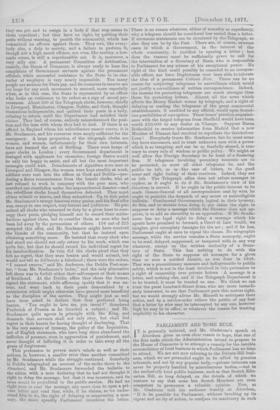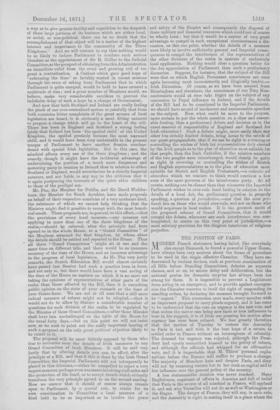PARLIAMENT AND HOME RULE.
IT is generally believed, and Mr. Gladstone's speech at Aberdeen gives us even clear reason to hope, that one of the first tasks which the Administration intend to propose to the House of Commons is to attempt a remedy for the terrible accumulation of local business to which Parliament has no time to attend. We are not now referring to the Private-Bill busi- ness, which we are persuaded ought to be sifted by genuine tribunals, and not by any popular body,—private interests can never be properly handled by miscellaneous bodies,—but to the exclusively local public business, such as that Scotch Edu- cation Bill, so long delayed, on the details of which we venture to say that none but Scotch Members are even competent to pronounce a valuable opinion. Now, as Mr. Gladstone told his audience frankly at Aberdeen, " If it be possible for Parliament, without breaking up its vigour and un ity of action, to readjust its machinery in such IT is generally believed, and Mr. Gladstone's speech at Aberdeen gives us even clear reason to hope, that one of the first tasks which the Administration intend to propose to the House of Commons is to attempt a remedy for the terrible accumulation of local business to which Parliament has no time to attend. We are not now referring to the Private-Bill busi- ness, which we are persuaded ought to be sifted by genuine tribunals, and not by any popular body,—private interests can never be properly handled by miscellaneous bodies,—but to the exclusively local public business, such as that Scotch Edu- cation Bill, so long delayed, on the details of which we venture to say that none but Scotch Members are even competent to pronounce a valuable opinion. Now, as Mr. Gladstone told his audience frankly at Aberdeen, " If it be possible for Parliament, without breaking up its vigour and un ity of action, to readjust its machinery in such a way as to give greater facility and expedition to the despatch of those large portions of its business which are either local, or social, or non-political, there can be no doubt that the accomplishment of that object will be a Matter of the highest interest and importance to the community of the Three Kingdoms." And we will venture to say that nothing would be so likely to induce Parliament to condone such serious blunders as the appointment of Sir B. Collier to the Judicial Committee, as the prospect of obtaining from this Administration an immediate relief from the cruel and growing evil of too great a centralization. A Cabinet which gave good hope of 'redeeming the time' so lavishly wasted in recent sessions through the error of asking from Parliament that to which Parliament is quite unequal, would be held to have covered a multitude of sins ; and a great number of Members would, we believe, make very considerable sacrifices to prevent the indefinite delay of such a hope by a change of Government.
And now that both Scotland and Ireland are really feeling the pinch of our over-centralized system so painfully that from both countries bitter complaints of the great arrears of local legislation are heard, it is obviously a most fitting moment to propose a change which will go to the heart of the evil. There has been in England and Scotland a strong feeling lately that Ireland has been the spoiled child ' of the United Kingdom, the spoiled precisely because the most wayward child, and it would have been very undesirable in the present temper of Parliament to have another Session overbur- dened with special Irish legislation. But in this case, the mischief affects every one of the three kingdoms ; and the remedy, though it might have the incidental advantage of undermining the position of a much more dangerous and menacing party in relation to Ireland than in relation to either Scotland or England, would nevertheless be a strictly Imperial measure, and not liable in any way to the criticism that it is again postponing the interests of the quiet elder children to those of the prodigal son.
Mr. Pim, the Member for Dublin, and Sir David Wedder- burn, the Member for South Ayrshire, have made proposals on behalf of their respective countries of a very moderate kind, the substance of which we cannot help thinking that the Ministry might find it possible to accept with the most benefi- cial result. These proposals are, in general, to this effect,—that the provisions of every local measure,—any measure not applying to more than one of the three kingdoms of the realm,—should be referred, after the principle had been agreed to in the whole House, to a " Grand Committee " of the Members returned for that kingdom, by whom alone the details should be settled and reported to the House. Thus
• all three " Grand Committees " might sit at one and the same time on different bills, and there would be an immense economy of the time of the House, and an immense advantage to the progress of local legislation. As Mr. Pim very justly remarks, the Scotch Education Bill would almost certainly have passed last Session had such a practice been in force, and not only so, but there would have been a vast saving of the time of the House on matters on which it is no more use taking the opinions of representatives of other parts of the realm than those affected by the Bill, than it is consulting public opinion on the state of your stomach or the time of your dinner-hour. We are not at all sure that a still more radical measure of reform might not be adopted,—that it would not do to allow by Statute a considerable number of questions for each division of the realm to be regulated by the Minutes of these Grand Committees,—after those Minutes shall have lain unchallenged on the table of the House for the usual forty days,—but on this point we will not insist now, as we wish to point out the really important bearing of such a proposal on the only great political objection likely to be raised to it.
The proposal will be most bitterly opposed by those who fear to surrender even the details of Irish measures to any Grand Committee of Irish Members. It will be said very justly that by altering details you can, in effect, alter the principle of a Bill, and that if this is done by the Irish Grand Committee, the imperial Parliament will not infrequently be placed in this dilemma,—either be compelled to reject a very urgent measure, perhaps even ameasure involving civil order and the protection of life itself, or to accept details which virtually transform the very principle agreed to on the second reading. Now we answer that it should of course always remain open to Parliament, by a special vote, to retain for its own consideration in Committee a local measure of a kind held to be so important as to involve the peace
and safety of the Empire and consequently the disposal of those military and financial resources which could not of course be wholly local ; but that it would be a matter of very great advantage to compel in such exceptional circumstances a dis- cussion, on this one point, whether the details of a measure were likely to involve sufficiently general and Imperial conse- quences to compel the interference of the representatives of the other divisions of the realm in matters of exclusively local application. Nothing would clear a question better for the due appreciation of Parliament than such a preliminary discussion. Suppose, for instance, that the subject of the Bill were that on which English Protestant consciences are ones again becoming most inconsistently and illogically tender,— Irish Education. Of course, as we have been assured from Birmingham and elsewhere, the consciences of our Tory Non- conformists would at once take fright on the subject of any concession to Papal influence in Ireland, and if the details of the Bill had to be considered in the Imperial Parliament, we should have no end of incoherent and unreasonable speeches on the subject. Now, what could be more to the purpose, more certain to put the whole question on a clear and reason- able footing, than a preliminary debate and decision as to the exact amount of responsibility of England and Scotland for
Irish education Such a debate might, more easily than any other less strictly limited debate, bring home to the minds of our quasi-propagandists, that if we oan be right in r wersing or controlling the wishes of Irish lay representatives duly elected by the Irish people as to the plan of education most suitable for that people, then the Irish Catholics, if the relative numbers of the two peoples were interchanged, would clearly be quite as right in reversing or controlling the wishes of Scotch. and English representatives as to the plan of education most suitable for Scotch and English Protestants,—a reduetio a,l absurdum which we venture to think would convince a few even of the most perverse of the interference party. At all events, nothing can be clearer than that whenever the Imper ial Parliament wishes to over-rule local feeling in relation to the details of a local Act, the preliminary question is. properly speaking, a question of jurisdictions—nor that the ones pro- bandi lies on those who would over-rule, and not on those who would acquiesce in local wishes. It is the greatest merit of the proposed scheme of Grand Committees, that it would compel the debate, whenever any such interference was con- templated, to centre on this very point of jurisdiction,—a most salutary provision for the illogical fanaticism of religious prejudice.











































 Previous page
Previous page